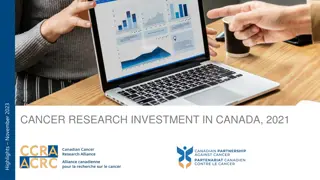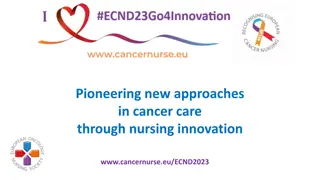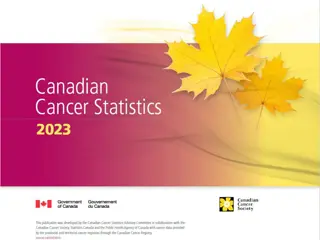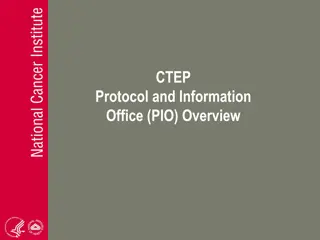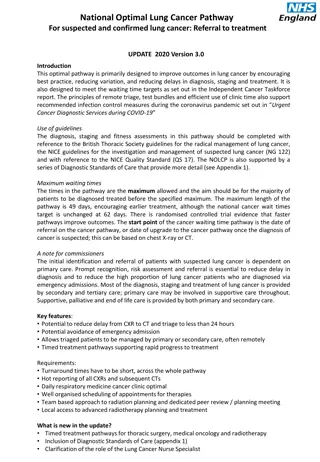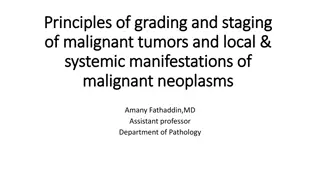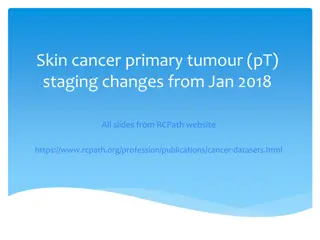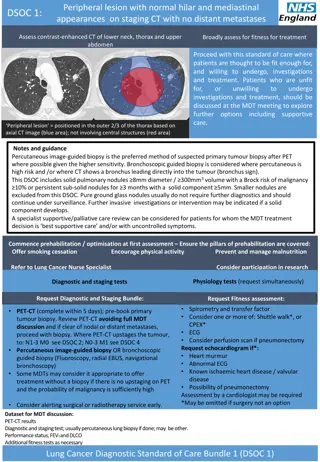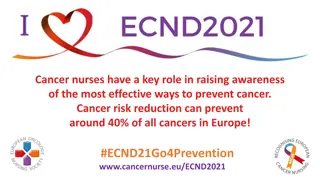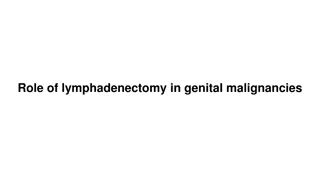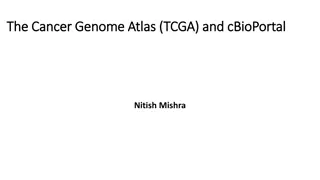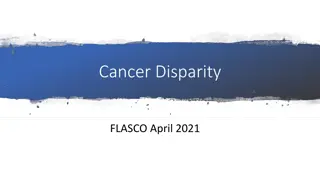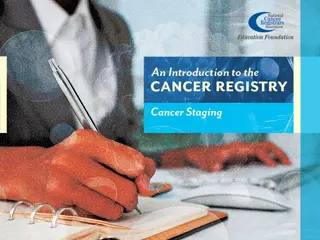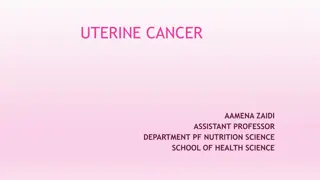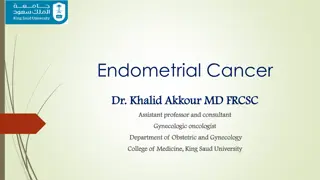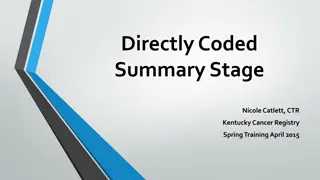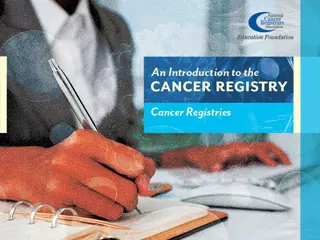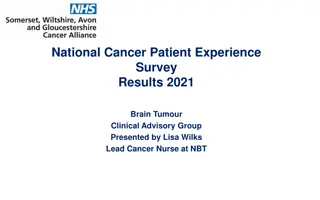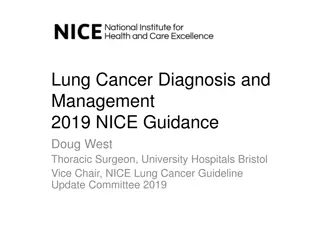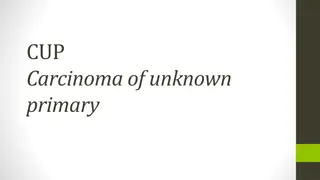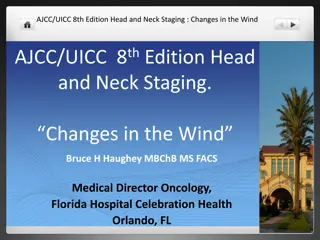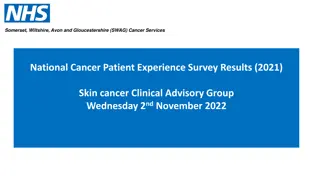What you need to know about the HPV Vaccine
Globally, cervical cancer is the fourth most common cancer in women, with 6,04,000 new cases in 2020. Women living with HIV are 6 times more likely to develop cervical cancer, compared to the general population, and an estimated 5% of all cervical cancer cases are attributable to HIV. The contributi
2 views • 7 slides
Cancer Research Investment in Canada - Highlights November 2023
The Canadian Cancer Research Alliance (CCRA) is a collaboration of organizations funding cancer research in Canada to advance prevention, diagnosis, and treatment. Established in 2005, CCRA has grown to over 35 members and published strategic plans to enhance cancer research outcomes. The Alliance s
2 views • 40 slides
Pioneering new approaches in cancer care through nursing innovation
Pioneering cancer nurses in Europe are driving advancements in cancer care through innovative approaches, evidence-based knowledge, and personalized patient-centered care. They play a vital role in cancer prevention, healthcare policy enhancement, and education improvement. By putting patients and f
0 views • 12 slides
Europe Cancer Diagnostics Market: Emerging Trends in Liquid Biopsy and Next-Gene
The Europe Cancer Diagnostics Market is projected to reach $12.21 billion by 2031, at a CAGR of 5.6% during the forecast period 2024\u20132031. The Europe cancer diagnostics market is driven by the rising prevalence of cancer, supporting initiatives for early cancer diagnosis, increasing investments
3 views • 4 slides
Canadian Cancer Statistics 2023 Overview
The Canadian Cancer Statistics 2023 report provides a comprehensive analysis of cancer data, including trends, statistics, and insights for the year. The report covers various aspects of cancer, such as incidence rates, survival rates, types of cancers diagnosed, and advancements in cancer treatment
0 views • 31 slides
Cancer Therapy Evaluation Program (CTEP) Overview
The Cancer Therapy Evaluation Program (CTEP) aims to enhance cancer patients' lives by advancing cancer treatment through research and clinical trials. The Program includes a Protocol and Information Office (PIO) to streamline trial development processes. It funds national cancer research and focuse
0 views • 27 slides
National Optimal Lung Cancer Pathway: Referral to Treatment Update 2020 Version 3.0
This optimal pathway aims to improve outcomes in lung cancer by reducing delays in diagnosis, staging, and treatment, while meeting waiting time targets. It emphasizes remote triage, test bundles, and efficient clinic use. The pathway includes maximum waiting times, timely treatment pathways, and gu
0 views • 16 slides
Understanding Corn Growth Stages: Leaf Staging Methods and Considerations
Various leaf staging methods, including the Leaf Collar Method and Droopy Leaf Method, are used to identify corn plant growth stages. The Leaf Collar Method involves counting leaves with visible collars, while the Droopy Leaf Method considers leaves at least 40-50% exposed from the whorl. Factors li
0 views • 9 slides
Understanding Grading and Staging of Malignant Tumors in Cancer Patients
Grading and staging are crucial in determining the aggressiveness and extent of malignant tumors. Grading involves assessing the level of malignancy based on cell differentiation and mitotic activity, while staging considers the size of the tumor, lymph node involvement, and presence of metastases.
7 views • 31 slides
Skin Cancer Primary Tumour Staging Changes: RCPath Updates
Explore the latest primary tumour staging changes for skin cancer, including updates from RCPath, datasets for BCC and SCC, changes in TNM classification for skin carcinomas, and upcoming new college datasets. Dive into the evolving landscape of skin cancer staging since January 2018 with detailed s
0 views • 11 slides
Standard of Care for Peripheral Lesion Assessment in Lung Cancer
The provided guidelines outline the standard care pathway for assessing peripheral lesions in lung cancer patients based on staging CT findings. It includes recommendations for biopsy methods, fitness assessment, PET-CT imaging, and considerations for treatment decisions. The protocol emphasizes tai
0 views • 5 slides
Empowering Cancer Prevention Through Nurse-Led Initiatives
Cancer nurses play a crucial role in raising awareness about effective cancer prevention methods, supporting the European Code Against Cancer, providing advice for risk reduction, promoting health literacy, and encouraging early diagnosis through screening programs. Their expertise and leadership ar
0 views • 30 slides
Role of Lymphadenectomy in Genital Malignancies
Pelvic and paraaortic lymph node evaluation is crucial in the surgical staging of gynecological malignancies. The goals of lymph node dissection are to determine disease extent and guide further treatment. Pelvic lymph nodes include common iliac, external and internal iliac, obturator, sacral, and p
0 views • 16 slides
Understanding the Cancer Genome Atlas (TCGA) Project
The Cancer Genome Atlas (TCGA) project, initiated in 2005, aims to identify genetic mutations in cancer through genome sequencing. Supervised by the Center for Cancer Genomics, TCGA has expanded over the years, publishing numerous research articles and involving various tumor types. The project has
0 views • 7 slides
Cancer Survival Rates in Europe: Trends and Disparities
Cancer survival rates in Europe have shown variations across different types of cancer and countries. While overall cancer mortality has increased over the years, some countries have experienced declines in mortality rates. Survival rates for breast cancer between 1995-2014 ranged from 74% to 89%, w
0 views • 17 slides
Understanding Cancer Health Disparities and Initiatives
Exploring the concept of cancer health disparities, this content touches on the National Cancer Act of 1971, the impact of social determinants of health, and various initiatives such as the National Minority Cancer Awareness Week. It highlights efforts to reduce disparities through research, advocac
6 views • 8 slides
Understanding Cancer Staging: Purpose, Sources, and Systems
Cancer staging is crucial in assessing the extent of cancer, determining appropriate treatment, and predicting prognosis. This process involves various sources such as physical exams, radiology scans, and pathology reports. Major staging systems like SEER and AJCC help classify cancer stages. Differ
0 views • 17 slides
Understanding Cancer: Causes, Symptoms, and Prevention
Cancer is a disease characterized by the uncontrollable growth and spread of abnormal cells in the body. These cells form tumors that can be either cancerous (malignant) or non-cancerous (benign). Cancer can develop in various parts of the body and is often caused by genetic changes that affect cell
3 views • 21 slides
Understanding Endometrial Cancer: Risk Factors, Diagnosis, and Management
Endometrial cancer, the most common gynecological malignancy in women, presents with abnormal uterine bleeding and affects women mainly during menopause. Risk factors include hormonal stimulation and estrogen levels. Differentiating between types of endometrial cancer can impact treatment decisions.
3 views • 31 slides
Understanding Data Submission in Cancer Registry Systems
Data submission in cancer registry systems serves the purpose of contributing to a larger pool of information for monitoring cancer trends, determining patterns, guiding program planning, and assisting public health professionals. Organizations like the State Central Cancer Registries and national p
1 views • 11 slides
Advances in Anticoagulation Therapy for Cancer-Related VTE and Stroke
Recent studies have shown advancements in anticoagulation therapy for cancer patients with venous thromboembolism (VTE) and stroke prevention. Direct oral anticoagulants (DOACs) are now considered beneficial for treating VTE in cancer, offering advantages in administration and efficacy. Different an
3 views • 9 slides
Understanding Summary Staging in Cancer Cases
Staging cancer cases is a critical process to determine the extent of the disease at diagnosis. Summary staging, including SEER Summary Stage 2000, categorizes cancer spread, combining clinical and pathologic data. Learn about primary staging systems, summary staging groups, and how cancer spreads l
0 views • 41 slides
Humber, Coast and Vale Cancer Alliance - Cancer Champions Programme Overview
The Humber, Coast and Vale Cancer Alliance's Cancer Champions Programme, led by Trish Rawnsley, aims to raise awareness and promote early diagnosis of cancer. Developed in North East Lincolnshire in 2011, the program has trained almost 1,000 individuals, resulting in lower emergency presentations in
0 views • 10 slides
Understanding Cancer Registries and Their Significance
Cancer registries serve as vital information systems for collecting, storing, and analyzing cancer data to aid in research, prevention, treatment, and public health efforts. They help track cancer incidence, assist in identifying trends, and provide essential information to healthcare professionals
0 views • 18 slides
Patient Mobility and Cancer: Role of Joint Actions in European Cancer Care
Activities focusing on standardizing cancer care in Europe include quality assurance of screening programs, defining survivorship, establishing Comprehensive Cancer Control Networks, addressing socio-economic inequalities, and promoting public health genomics. The European Cancer Patient Coalition e
0 views • 7 slides
National Cancer Patient Experience Survey 2021 Results Overview
National Cancer Patient Experience Survey (NCPES) for 2021 focused on brain tumour patients and was led by Lisa Wilks, the Lead Cancer Nurse at NBT. The survey, commissioned by NHS England, aimed to monitor cancer care progress, drive quality improvements, and inform stakeholders. Methodology includ
0 views • 26 slides
Debunking Common Myths About Cancer and Nutrition
The journey of cancer diagnosis brings forth various challenges, including misconceptions about nutrition. Debunking myths like soy stimulating cancer cells, sugar feeding cancer, and acidic diets curing cancer is crucial for informed decision-making. Evidence shows that soy can be a part of a healt
1 views • 11 slides
Understanding Sentinel Lymph Nodes in Endometrial & Vulval Cancer
Exploration of sentinel lymph node (SLN) practices across SWAGGER preliminary data and guidelines for endometrial cancer, featuring insights from Exeter, Cheltenham, and Bristol cases. Additionally, BGCS guidelines for sentinel nodes in vulval cancer are discussed, emphasizing techniques for detecti
0 views • 23 slides
Understanding Neoplasia and Cancer: Key Concepts and Biological Aspects
Neoplasia encompasses abnormal tissue growth that can be benign or malignant. This article explores neoplastic terms, tumor classifications, cancer staging, and genetic factors in cancer development. Gain insights into the characteristics of benign tumors, the biology of cancer including carcinogene
0 views • 29 slides
Comprehensive Update on Lung Cancer Diagnosis and Management According to 2019 NICE Guidelines
Providing a detailed overview of the 2019 NICE guidance on lung cancer, this content covers various aspects including the role of NICE, types of guidance provided, updates on lung cancer surgery, recommendations on tobacco addiction interventions, diagnostic approaches, and new protocols for brain i
0 views • 35 slides
Updates on TNM-8 Staging for Urological Cancers: Insights by John Mitchard
An update by Consultant Histopathologist John Mitchard on TNM-8 staging for urological cancers, highlighting changes in RCC definitions and grading, along with minor adjustments in bladder staging. Details include revised pT3 criteria for kidney tumors, improvements in bladder M1 and T2 classificati
0 views • 14 slides
Global Cancer Statistics and Trends
The data presented showcases global cancer statistics from various years, highlighting the prevalence of different types of cancer across genders. It includes information on the estimated number of cancer cases, common types of cancers, and trends expected up to 2035. Lung cancer, breast cancer, and
0 views • 83 slides
Client Services Report: Pay Source 9999 County of San Diego
This report provides crucial information on services staging to Pay Source 9999 (Private Pay) in the County of San Diego. It is recommended to run this report monthly towards the end of the month to ensure correct staging. After running the report, check if services are staging correctly and make ne
0 views • 15 slides
Understanding Metastases in Cancer
Metastases in cancer refer to cancer cells spreading from the original tumor to other parts of the body through the bloodstream, lymphatic system, or direct extension. This content discusses cases of metastatic cancer, including imaging findings, staging, and biopsies, highlighting the challenges in
0 views • 44 slides
Integration of Complementary Medicine in Cancer Care in Tuscany
Describes the successful integration of Complementary Medicine in the network of Cancer Departments within the Tuscan Public Healthcare System. The initiative, spearheaded by experts in both Complementary Medicine and medical oncology, has led to the development of Regional Guidelines incorporating
0 views • 4 slides
Understanding Cancer Survival Statistics in England
Cancer survival statistics in England, analyzed in collaboration between Public Health England (PHE) and the Office for National Statistics (ONS), provide crucial insights into the effectiveness of cancer services. These statistics measure the mortality rates of cancer patients and inform various st
0 views • 25 slides
Cancer Types Spending in Europe
Learn about the spending on various types of cancer in Europe including breast cancer, colorectal cancer, prostate cancer, lung cancer, ovary cancer, and pancreatic cancer. The information is based on the Comparator Report on Cancer in Europe 2019, which covers disease burden, costs, and access to m
2 views • 7 slides
AJCC/UICC 8th Edition Head and Neck Staging Changes
This content delves into the changes in staging guidelines for head and neck malignancies as per the 8th edition of the AJCC/UICC criteria. It explores the modifications in staging for oropharynx cancer, neck metastatic disease, oral cavity depth of invasion, and cutaneous malignancies. The presenta
0 views • 32 slides
SWAG Cancer Services National Cancer Patient Experience Survey Results 2021 Overview
The SWAG Cancer Services National Cancer Patient Experience Survey Results for 2021 provide insights into the experiences of skin cancer patients in Somerset, Wiltshire, Avon, and Gloucestershire. The survey, commissioned by NHS England, aims to monitor progress in cancer care, drive local quality i
0 views • 27 slides
Best Real Estate Staging in Dalrock
Are you looking for the Best Real Estate Staging in Dalrock? Then contact Orderly Fashion LLC. Whether you\u2019re a home owner who wants to DIY or a realtor looking for staging tips, this could be the option for you. \u2018OF\u2019 will consult, sou
0 views • 6 slides

